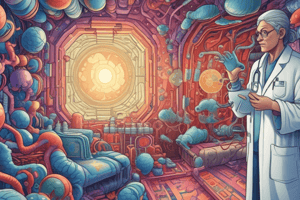Podcast
Questions and Answers
Where do B-lymphocytes complete their maturation?
Where do B-lymphocytes complete their maturation?
- Bone marrow (correct)
- Liver
- Spleen
- Thymus
Which cells are absent from normal tissue and are attracted by chemotactic factors to the site of infection?
Which cells are absent from normal tissue and are attracted by chemotactic factors to the site of infection?
- Eosinophils
- Neutrophils (correct)
- Monocytes
- T-helper cells
Which cells release toxic chemicals from granules and are important against helminths?
Which cells release toxic chemicals from granules and are important against helminths?
- Monocytes
- Eosinophils (correct)
- Basophils
- Neutrophils
Which cells represent the most numerous type of granulocytes?
Which cells represent the most numerous type of granulocytes?
Where do T lymphocytes originate and complete maturation?
Where do T lymphocytes originate and complete maturation?
Study Notes
Overview of the Immune System
- The immune system's primary function is to prevent or limit infections, fungi, and parasites, such as protozoa and worms.
- The immune system consists of two arms: Innate Immunity and Acquired Immunity.
Innate Immunity vs Acquired Immunity
- Innate Immunity is present since birth, providing immediate but less efficient response to infections.
- Acquired Immunity is more delayed but highly effective, providing specific responses to pathogens upon exposure.
- Innate Immunity is non-specific, whereas Acquired Immunity is specific and directed against certain pathogens.
- Innate Immunity lacks immunological memory, whereas Acquired Immunity develops immunological memory, providing life-long protection.
Characteristics of Innate Immunity
- Innate Immunity interacts with Acquired Immunity through opsonization.
- Main cells involved in Innate Immunity are neutrophils, monocytes, macrophages, and Natural Killer (NK) cells.
Mechanisms of Innate Immunity
Mechanical Barriers and Surface Secretions
- Intact skin and mucous membranes serve as physical barriers against pathogens.
- Cilia of the respiratory tract, blinking, sneezing, and coughing reflexes help remove pathogens.
Normal Bacterial Flora
- Normal bacterial flora competes with pathogenic bacteria for essential nutrients, limiting their growth.
Other Mechanisms of Innate Immunity
- Additional mechanisms of Innate Immunity are present, but not specified.
Studying That Suits You
Use AI to generate personalized quizzes and flashcards to suit your learning preferences.
Description
Test your knowledge on the overview of the immune system with this quiz. Explore topics such as the functions of the immune system, the two arms of the immune system - innate immunity and acquired immunity, and their characteristics.




